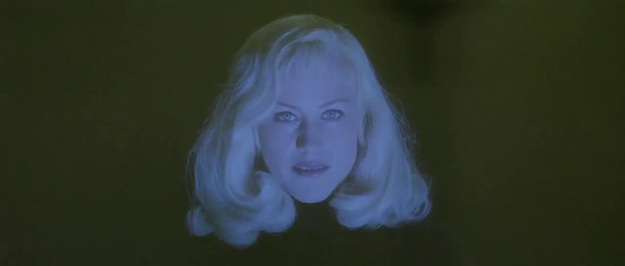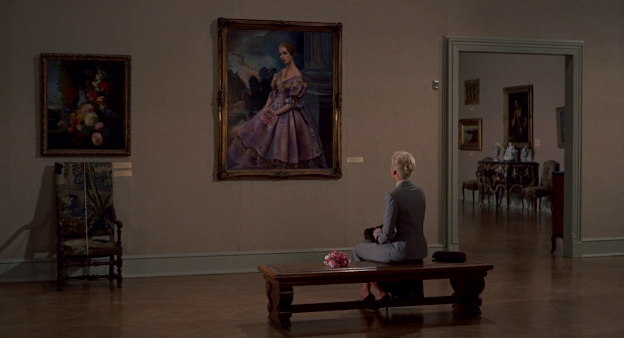Blog 8
Lost Audience
Lost Highway (1997) is one
of the David Lynch movies that is not easy to watch. We can say that the “struggle
and confusion” audience experience, generally derives from the narrative of the
movie. David Lynch chooses to tell the story in a mixing way. He is building the
story then he crushes it and let audience reunite the puzzles of the narrative.
We know that the linear narratives are easy to follow for the audience because
the audience’s perception about the events or the characters stays clear and
the story moves in a cumulative way. Metz mentions that, we as an audience, are
tend to put ourselves into the characters’ place while we are watching the film
similarly with the mirror stages of children: “…there is one thing and one
thing only that is never reflected in it: the spectator’s own body. In a
certain emplacement, the mirror suddenly becomes clear glass.”, “the spectator
knows that objects exist, that he himself exists as a subject, that he becomes
an object for others.” (p.696)
So, in Lost Highway, our
protagonist getting through a similar process. He is always trying to find his
identity between different fantasy worlds. We saw both Fred and Pete are
looking at the mirror in a very similar way and in Lacanian perspective they
are struggling with their mirror stage. (00:38:03-01:08:20) Then, even the main
character does not know who he is, how the audience’s process of emplacement
will occur? I think this is one of the main questions when we try to talk about
the movie. David Lynch breaks the resistance of lazy audience and invite them
to join the process of searching and understanding while witnessing the events.
He let the audience take part in the movie but not with an easy way.
Mets says that the spectators also is a
perceiving subject and they aware of it : “At the cinema, it is always the
other who is on the screen; as for me, I am there to look at him. I take no
part in the perceived, on the contrary, I am all-perceiving. All-perceiving as
one says all-powerful” , “I know I am perceiving something imaginary (and that
is why its absurdities, even if they are extreme, do not seriously disturb me),
and I know that it is I who am perceiving it.” (p.697)
David Lynch knows that the
careful audience can feel the perceiving process, but he wants to make their
process more painful with the narrative structure and complex spatial and
temporal relations he uses in the movie. Despite the Metz’s ideas, the
perception process of the audience getting more and more difficult so the absurdities
in the movie starts to disturb the audience. It makes the audience distanced to
themselves from the characters and makes their understanding process of the
movie more challenging. I agree with the psychoanalytic explanations of the
Zizek about Lost Highway. It is a fact that everything starts after Fred’s
failure in his sex life. He wants to be Pete and he does not want to remember
anything from his past life except Rene. The scene that Pete hears a saxophone melody
in radio and feeling uncomfortable is also supporting this theory. (01:12:00)
We also see the Mystery Man first
time after this failure. So, who is this man and what does he symbolize? Is he
helping the “lost audience” of the movie in some way? Metz mentions that audience’s
identification process with the camera itself is important: “ Without this
identification with the camera certain facts could not be understood, though
they are constant ones: the fact, for example, that the spectator is not amazed
when the image “rotates”…” (p.698) We are seeing the Mystery Man with his
camera and he is recording everything. https://youtu.be/LIvClGlWiz8?t=77
He generally records the murders. From the beginning of the movie, the tension between Fred and his wife makes audience uncomfortable. We are expecting that something bad going to happen and Mystery Man’s recordings fulfill the audience’s wish about violence. Good or bad the audience wants to know what is happening. While Fred fighting with Mr. Eddy the Mystery Man who always look threatening to the Fred, helps him, and gives him the knife.
https://youtu.be/Cx6GmNCfPpI?t=87
So, he is taking place next to Fred
and at some point, he represents the audience’s subconscious. I think the Mystery Man is a David Lynch’s
perception of the audience and he is there for the sake of helping the “lost
audience” of the movie.
Bibliyography
Metz. Christian. Identification/Mirror. Leo Braudy & Marshall Cohen eds. Film Theory and Criticism 7th edition, New York: Oxford University Press, 2009. (p.694-701)
Film link: https://tafdi.org/izle/altyazili/3420-lost-highway






Yorumlar
Yorum Gönder